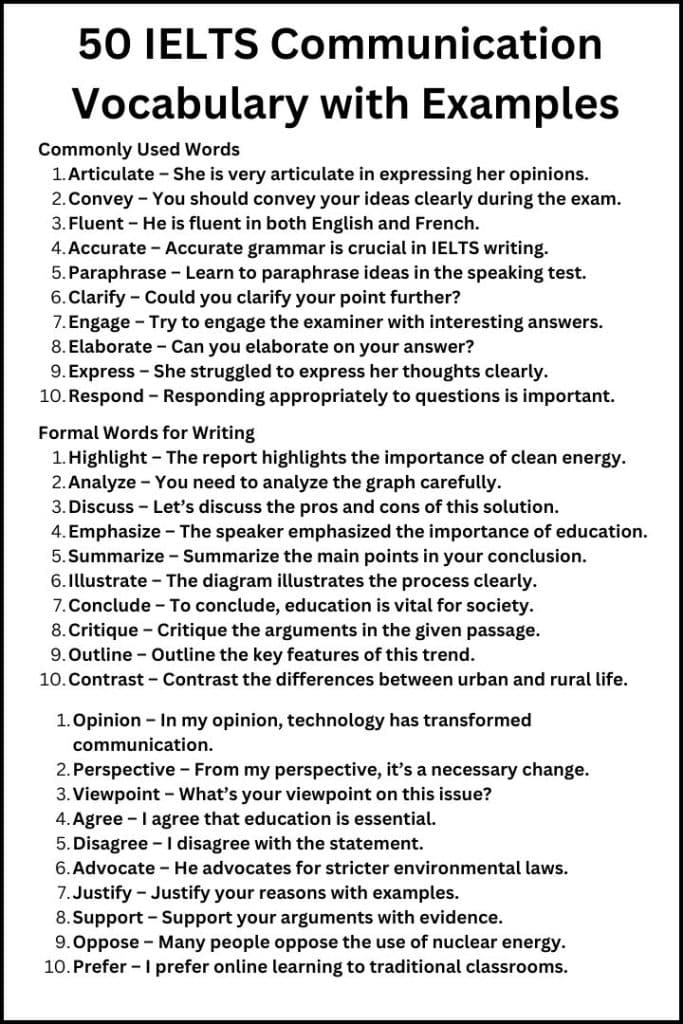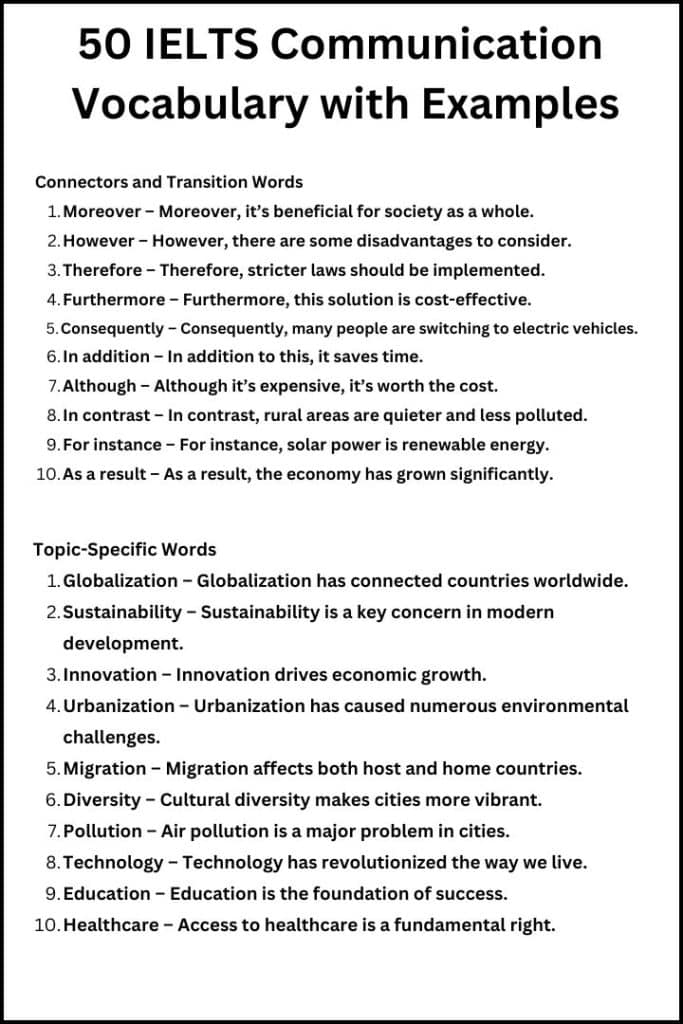When preparing for the IELTS exam, mastering IELTS communication vocabulary is essential for success in both speaking and writing tasks. These words help you express your thoughts clearly, sound confident, and impress examiners with accurate usage. Whether you’re aiming for a higher band score or simply improving your English skills, having a solid vocabulary is a game-changer.

50 IELTS Communication Vocabulary with Examples
Commonly Used Words
- Articulate: She is very articulate in expressing her opinions.
- Convey: You should convey your ideas clearly during the exam.
- Fluent: He is fluent in both English and French.
- Accurate: Accurate grammar is crucial in IELTS writing.
- Paraphrase: Learn to paraphrase ideas in the speaking test.
- Clarify – Could you clarify your point further?
- Engage: Try to engage the examiner with interesting answers.
- Elaborate – Can you elaborate on your answer?
- Express: She struggled to express her thoughts clearly.
- Respond: Responding appropriately to questions is important.
Formal Words for Writing
- Highlight: The report highlights the importance of clean energy.
- Analyze: You need to analyze the graph carefully.
- Discuss: Let’s discuss the pros and cons of this solution.
- Emphasize: The speaker emphasized the importance of education.
- Summarize: Summarize the main points in your conclusion.
- Illustrate: The diagram illustrates the process clearly.
- Conclude: To conclude, education is vital for society.
- Critique: Critique the arguments in the given passage.
- Outline: Outline the key features of this trend.
- Contrast: Contrast the differences between urban and rural life.
Words for Describe Opinions
- Opinion: In my opinion, technology has transformed communication.
- Perspective: From my perspective, it’s a necessary change.
- Viewpoint – What’s your viewpoint on this issue?
- Agree—I agree that education is essential.
- Disagree: I disagree with the statement.
- Advocate: He advocates for stricter environmental laws.
- Justify: Justify your reasons with examples.
- Support: Support your arguments with evidence.
- Oppose: Many people oppose the use of nuclear energy.
- Prefer: I prefer online learning to traditional classrooms.
Topic-Specific Words
- Globalization: Globalization has connected countries worldwide.
- Sustainability: Sustainability is a key concern in modern development.
- Innovation: Innovation drives economic growth.
- Urbanization: Urbanization has caused numerous environmental challenges.
- Migration: Migration affects both host and home countries.
- Diversity: Cultural diversity makes cities more vibrant.
- Pollution: Air pollution is a major problem in cities.
- Technology: Technology has revolutionized the way we live.
- Education: Education is the foundation of success.
- Healthcare: Access to healthcare is a fundamental right.
Connectors and Transition Words
- Moreover, it’s beneficial for society as a whole.
- However, there are some disadvantages to consider.
- Therefore, stricter laws should be implemented.
- Furthermore, this solution is cost-effective.
- Consequently, many people are switching to electric vehicles.
- In addition to this, it saves time.
- Although, although it’s expensive, it’s worth the cost.
- In contrast, rural areas are quieter and less polluted.
- For instance: solar power is renewable energy.
- As a result, the economy has grown significantly.

Why is learning IELTS vocabulary so important for IELTS learners?
- Enhances Speaking Confidence
A strong vocabulary helps you sound fluent and confident during the speaking test. It allows you to express ideas clearly without pausing for words. - Improves Writing Scores
Using topic-specific words and synonyms in your essay showcases a higher level of English proficiency, which can boost your writing band score. - Helps Avoid Repetition
A diverse vocabulary helps you avoid repeating the same words, making your answers more engaging and professional. - Essential for Academic and General Tasks
Whether it’s describing trends, presenting arguments, or discussing personal experiences, vocabulary is the backbone of both academic and general IELTS tasks.
Difference Between General Vocabulary and IELTS Vocabulary
| Aspect | General Vocabulary | IELTS Vocabulary |
| Purpose | Everyday conversations and informal use. | Formal, structured, and exam-specific. |
| Complexity | Simple and common words. | Includes topic-specific and formal words. |
| Usage | Casual settings. | Academic, professional, or IELTS context. |
| Examples | Nice, good, bad, happy. | Articulate, analyze, elaborate, and clarify. |
IELTS Vocabulary Exercise
Fill in the blanks with the correct vocabulary words:
- Can you _______ on your idea further?
- _______ is one of the biggest challenges in urban areas.
- He needs to _______ his reasons in the essay.
- _______ has led to better connectivity across the globe.
- _____ is necessary for economic growth in the 21st century.
Answers:
- Elaborate
- Pollution
- Justify
- Globalization
- Innovation
Frequently Asked Questions on IELTS Communication Vocabulary
1. What are the most used words in IELTS speaking?
Commonly used words include articulate, fluent, convey, elaborate, and paraphrase. These help you express ideas clearly.
2. How can I improve my IELTS speaking vocabulary?
Read extensively, listen to English podcasts, practice speaking, and learn topic-specific words for common IELTS themes like environment, education, and technology.
3. What communication skills are important in IELTS speaking?
Key skills include fluency, coherence, pronunciation, and the ability to use varied vocabulary naturally.
4. Which part is most important in IELTS speaking?
The Part 2 “Cue Card” section is crucial because it tests your ability to speak at length on a given topic.
5. Which is the hardest part in IELTS?
Many students find Writing Task 2 (Essay) and Speaking Part 3 challenging due to the need for advanced vocabulary and critical thinking.

